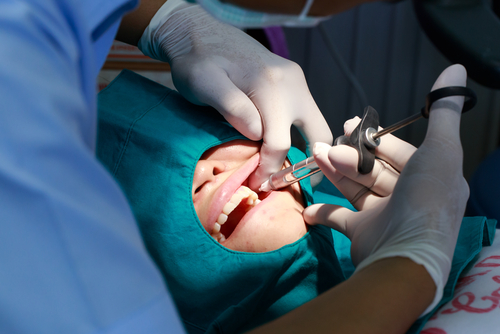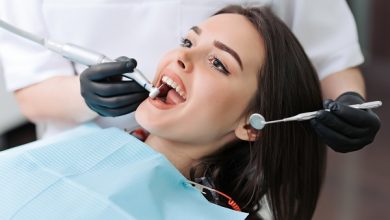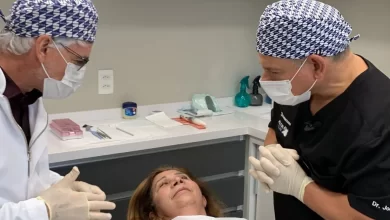How to Heal Gums After Dental Work?

To heal gums after dental work, follow proper oral hygiene practices and avoid irritating the area. After undergoing dental work, it’s common for gums to feel sensitive and tender.
Whether you’ve had a dental cleaning, filling, or extraction, it’s important to take steps to promote healing and minimize discomfort. Good oral hygiene practices, such as gently brushing your teeth and gums twice a day with a soft-bristled toothbrush and using an antimicrobial mouthwash, can help prevent infection and speed up healing.
Avoid irritating the gum area by avoiding hard or crunchy foods and tobacco use. Additionally, applying a cold compress to your face can help reduce swelling and discomfort. By giving your gums proper care, you can ensure a smooth and speedy recovery after dental work.
What To Expect After Dental Work
Recovering from dental work is a natural process that requires time and patience. After dental work, it is normal to experience a wide range of symptoms and discomfort. The most common symptoms include pain, swelling, and sensitivity around the gums. It is important to note that each person’s recovery time may vary depending on the type and extent of the dental procedure. Normally, it takes a few days to a week for the gums to heal completely. During this time, it is recommended to follow the dentist’s instructions, which may include taking prescribed medications, maintaining oral hygiene, and avoiding hard or chewy foods. It is also advisable to avoid smoking and alcohol consumption as they can delay the healing process. If you experience severe or prolonged pain, bleeding, or any other concerns, it is best to contact your dentist for further guidance and support.

Credit: www.temeculafacialoralsurgery.com
Proper Oral Hygiene Practices
The proper oral hygiene practices are crucial for healing gums after dental work. Gentle brushing and flossing play a vital role in maintaining gum health. It is important to choose the right toothbrush that has soft bristles to avoid further irritation and damage to the gums. Additionally, using toothpaste specifically designed for sensitive gums can help in the healing process. Regular brushing should be done twice a day, being cautious not to brush too forcefully. Flossing is equally important as it helps to remove food particles and plaque from between the teeth and along the gum line. For added protection, using a mouthwash containing antimicrobial properties may help in reducing bacteria in the mouth. It is recommended to use the mouthwash after brushing and flossing to provide additional care and support to the healing gums.
Soothing The Gums
htmlRinsing your mouth with warm salt water is a simple and effective way to promote gum healing after dental work. Create a solution by dissolving half a teaspoon of salt in a cup of warm water. Gently swish the mixture in your mouth for about 30 seconds, ensuring it reaches the affected areas. The salt water helps reduce swelling and inflammation, soothes soreness, and promotes healing.
Another way to ease gum discomfort and aid in healing is by applying a cold compress to the affected area. Wrap an ice pack or a bag of frozen peas in a thin cloth and hold it against your cheek near the surgery site. The cold temperature helps numb the area, reduce swelling, and alleviate pain. Remember to apply the cold compress for short intervals and not directly to your gums.
While your gums are healing, it is essential to avoid hot or spicy foods that can irritate the surgical site and prolong the healing process. Stick to lukewarm or cold foods and beverages, such as yogurt, smoothies, and soft foods like mashed potatoes or scrambled eggs. Opting for a gentle diet allows your gums to recover without additional discomfort.
Eating And Drinking Recommendations
After dental work, it is important to pay attention to what you eat and drink to promote gum healing. Opting for soft foods that are easy to chew can prevent unnecessary strain on your gums and teeth. These can include mashed potatoes, yogurt, scrambled eggs, soups, and smoothies. Remember to stay hydrated by drinking plenty of water throughout the day.
Avoiding alcohol and caffeine is highly recommended as they can hinder the healing process. Alcohol can irritate the gums, while caffeine may restrict blood flow, making it harder for the gums to heal properly. Instead, choose herbal teas or decaffeinated options to satisfy your beverage cravings.
Managing Pain And Swelling
After undergoing dental work, it is common to experience pain and swelling in the gums. To manage these symptoms, there are several effective strategies you can try:
- Over-the-counter pain relievers: Taking over-the-counter pain relievers such as ibuprofen can help reduce discomfort and inflammation in the gums.
- Applying topical numbing gels: Applying topical numbing gels directly on the affected area can provide temporary relief by numbing the gums.
- Utilizing cold packs and heat therapy: Alternating between cold packs and heat therapy can help reduce swelling and soothe the gums. Applying a cold pack for 15 minutes followed by a warm compress can promote healing.
By following these methods, you can alleviate pain and swelling in your gums after dental work. Remember to consult your dentist if the symptoms persist or worsen.
When To Seek Professional Help
When to Seek Professional Help:
If you experience any signs of infection or complications, it is important to consult a dental professional. Some indicators include:
- Persistent pain beyond normal recovery time: If your gums continue to hurt even after the expected healing period, it could be a sign of an underlying issue.
- Excessive bleeding or swelling: While some bleeding and swelling are normal after dental work, if it becomes excessive or doesn’t subside, it may indicate a problem.
If you notice any of these symptoms, don’t hesitate to contact your dentist for proper evaluation and treatment. Remember, seeking timely professional help can ensure proper healing and prevent further complications.
Follow-up Care And Dental Appointments
Importance of follow-up appointments: After dental work, it is important to schedule and attend follow-up appointments with your dentist. These appointments allow your dentist to check the progress of your healing gums and ensure that any issues or concerns are addressed. Regular dental visits are essential for maintaining the health of your gums and overall oral hygiene.
Maintaining good oral hygiene post-treatment: Following dental work, it is crucial to continue practicing good oral hygiene. This includes brushing your teeth twice a day with a soft-bristled toothbrush, flossing daily, and using an antimicrobial mouthwash. These habits will help prevent infection and promote the healing of your gums, ensuring a successful recovery.
Addressing any concerns with your dentist: If you have any concerns or experience any unusual symptoms after dental work, it is important to discuss them with your dentist. They can provide guidance and reassurance, as well as identify any potential complications that may require further treatment. Open communication with your dentist is key to ensuring the best possible care for your gums during the healing process.
Taking Care Of Your Overall Oral Health
Regular brushing and flossing: Brushing and flossing your teeth regularly is crucial in maintaining good oral health. Brush at least twice a day and floss at least once a day to remove plaque and food particles that can contribute to gum disease and other dental problems.
Scheduling routine dental cleanings: Regular dental cleanings are essential for keeping your gums healthy. Schedule a dental appointment every six months to have your teeth professionally cleaned and examined by a dentist. This helps in identifying and addressing any issues before they become more serious.
Incorporating healthy habits into your oral care routine: Besides brushing and flossing regularly, there are other healthy habits you can incorporate into your oral care routine. These include using an antibacterial mouthwash, drinking plenty of water, avoiding tobacco products, and eating a balanced diet that includes foods rich in vitamins and minerals essential for oral health.
Summary: Taking care of your overall oral health involves regular brushing and flossing, scheduling routine dental cleanings, and incorporating healthy habits into your oral care routine. By following these practices, you can effectively heal gums after dental work and maintain a healthy smile.
Frequently Asked Questions Of How To Heal Gums After Dental Work?
How Long Does It Take For Gums To Heal After Dental Work?
Gums typically heal after dental work in about one to two weeks.
How Can I Make My Gums Heal Faster?
To help gums heal faster: 1. Maintain good oral hygiene by brushing twice daily and flossing regularly. 2. Rinse your mouth with warm saltwater to reduce swelling and promote healing. 3. Avoid irritants like smoking and alcohol that can delay healing.
4. Eat a balanced diet with vitamin C and avoid sugary foods that can worsen gum problems. 5. Stay hydrated to support the body’s healing process.
What Do Healing Gums Look Like?
Healing gums appear pink and firm, without any swelling or bleeding.
How Long Does It Take For Gums To Heal After Dental Work?
It typically takes about one to two weeks for gums to fully heal after dental work. However, the exact healing time can vary depending on the individual and the nature of the dental procedure.
Conclusion
Taking proper care of your gums after dental work is crucial for a speedy and successful recovery. By following the tips and techniques mentioned in this blog post, you can alleviate discomfort and promote healing. Remember to maintain good oral hygiene, avoid certain foods, and regularly consult your dentist for any concerns.
With patience and consistent care, you can ensure the health and wellbeing of your gums long after your dental procedure.






2 Comments